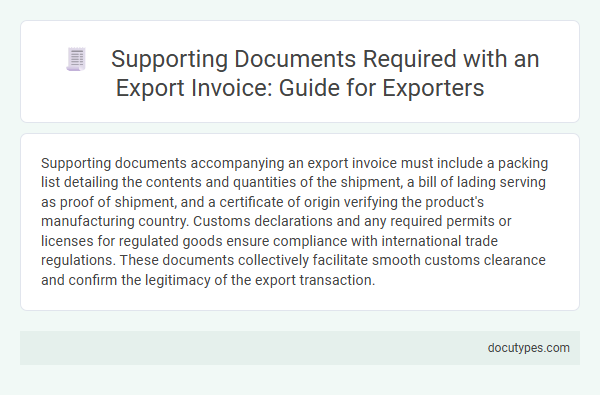Supporting documents accompanying an export invoice must include a packing list detailing the contents and quantities of the shipment, a bill of lading serving as proof of shipment, and a certificate of origin verifying the product's manufacturing country. Customs declarations and any required permits or licenses for regulated goods ensure compliance with international trade regulations. These documents collectively facilitate smooth customs clearance and confirm the legitimacy of the export transaction.
Introduction to Export Invoice Documentation
An export invoice is a critical document in international trade, detailing the transaction between the exporter and importer. Proper documentation ensures compliance with customs regulations and facilitates smooth cargo clearance.
- Commercial Invoice - Serves as the primary document outlining product details, quantities, prices, and payment terms.
- Packing List - Provides a detailed breakdown of the goods' packaging, weight, and dimensions for logistical purposes.
- Certificate of Origin - Verifies the country where the exported goods were manufactured or processed, essential for customs and trade agreements.
Importance of Supporting Documents in Export
Supporting documents accompanying an export invoice are crucial for verifying the authenticity and legality of the shipment. Essential documents include the bill of lading, packing list, certificates of origin, and export licenses, which ensure compliance with international trade regulations. These documents facilitate smooth customs clearance, prevent delays, and protect both exporters and importers from potential disputes.
Essential Export Invoice Supporting Documents
Essential export invoice supporting documents ensure smooth customs clearance and accurate shipment verification. These documents provide proof of transaction details, shipment contents, and compliance with international trade regulations.
Commonly required documents include the commercial invoice, packing list, and bill of lading. Additional certifications, such as certificates of origin, export licenses, and insurance certificates, may be necessary based on the destination country's requirements.
Commercial Invoice: Key Requirements
The Commercial Invoice is a critical document in the export process, serving as the primary evidence of the transaction between buyer and seller. It must contain specific details to comply with customs regulations and facilitate smooth international trade.
- Accurate Buyer and Seller Information - Includes full names, addresses, and contact details to clearly identify parties involved in the transaction.
- Detailed Description of Goods - Specifies quantity, unit price, total value, product classifications, and HS codes for proper customs assessment.
- Payment and Shipment Terms - Outlines INCOTERMS, payment methods, currency, and shipment date to define responsibilities and financial conditions.
Ensuring these key requirements are met on the Commercial Invoice helps prevent delays and penalties during export customs clearance.
Packing List: Format and Details
| Supporting Document | Purpose | Format Requirements | Essential Details |
|---|---|---|---|
| Packing List | Supports the export invoice by detailing the contents, helping customs clearance and shipment verification. | Typically on company letterhead. Clear, organized table format showing itemized details. Must be easily readable and printed in English or the relevant destination language. |
|
Bill of Lading and Its Role
An export invoice must be accompanied by a Bill of Lading, a critical document that serves as proof of shipment and contract of carriage between the exporter and the carrier. The Bill of Lading details the type, quantity, and destination of the goods being shipped, ensuring proper tracking and delivery. This document also facilitates customs clearance and serves as a receipt acknowledging that the carrier has received the cargo in good condition.
Certificate of Origin: Purpose and Types
The Certificate of Origin is a crucial supporting document for an export invoice, verifying the country where the goods were manufactured. This document helps customs authorities determine tariffs, enforce import restrictions, and ensure compliance with trade agreements.
You must provide the Certificate of Origin to facilitate smooth customs clearance and avoid delays. Common types include a non-preferential certificate, which confirms the origin without tariff benefits, and a preferential certificate, used under trade agreements to qualify for reduced tariffs. Accurate completion of this document ensures your shipment meets regulatory requirements and supports the authenticity of your export invoice.
Export Licenses and Permits
What supporting documents must accompany an export invoice to ensure compliance with export regulations? Export licenses and permits are essential to validate the legal authorization for exporting specific goods. These documents verify that the shipment meets government requirements, preventing customs delays and penalties.
Inspection and Quality Certificates
Inspection and quality certificates are essential supporting documents that must accompany an export invoice. These certificates verify that the goods meet specified standards and comply with buyer and regulatory requirements.
You must ensure that the inspection report, issued by an authorized agency, confirms the condition and specifications of the exported products. Quality certificates demonstrate adherence to international quality benchmarks, reducing disputes and facilitating smooth customs clearance.
What Supporting Documents Must Accompany an Export Invoice? Infographic

